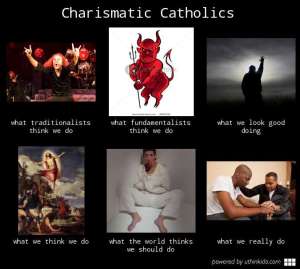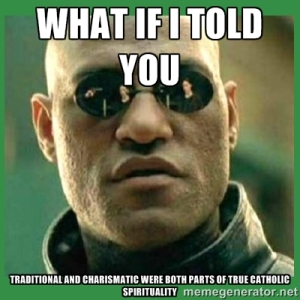“In prayer it is better
to have a heart without words
than words without a heart.”
-Mahatma Gandhi
My college campus is filled with people who claim to be connected with certain prayer types. Some are “charismatic”; some are “traditional.” Oftentimes, there is much contention between the charismatic (whom I’ve heard referred to as “Charismaniacs”) and the traditional (whom I’ve heard referred to as “Traddies”). My campus is known for its strong Catholic environment, but, while that can be seen from the outside, the view is different on campus. Much of the campus is divided on this issue of Traditional vs. Charismatic. Don’t get me wrong: this is a great Catholic campus. However, a lot of people make a huge deal about traditional or charismatic, and get lost in making this distinction. It seems as though people don’t actually understand what they are talking about. People will defend one side or the other, but all that they are doing is blowing smoke; they really do not know what they are talking about. [If you get frustrated at some point while reading this, please wait until the end to make a judgment.]
While there may be varying degrees of each of the sides, most people would not lie simply on one side, but somewhere in between. However, I will discuss the extremes. The Traditional Catholics are seen as the ones who greatly favor the way the Church has been for most of its history. Traditional Catholics have the desire to return back to only the Latin Mass. They favor keeping the Mass free of guitar and Praise & Worship-type music. They are known for frequent reception of the sacraments, always rigidly keeping to the beliefs and teachings of the Catholic Church. They usually view Traditional Catholicism as all that there should be. They are usually seen as being fairly ritualistic, allowing their prayer lives to be dictated by formulas for prayer. Traditional Catholics have the tendency to overemphasize the divinity of Christ and underemphasize the humanity of Christ. Common forms of prayer associated with Traditional Catholicism are Liturgy of the Hours, Latin Extraordinary Form Mass, Eucharistic Adoration (with silence), the Most Holy Rosary, Stations of the Cross, the Angelus, etc. Common practices of the Traditional Catholics include the wearing of scapulars, Total Consecration to the Blessed Virgin Mary, women veiling at Mass, receiving the Eucharist on the tongue, abstaining from meat on Fridays, etc.
 Charismatic Catholics, on the other hand, were basically non-existent until the 1970’s. This group resulted from a call for a Charismatic Renewal. They are generally known for being more lax about Catholic doctrine and teaching. They view the Church as having become ritualistic and difficult to be grasped by man. They usually favor more attainable Masses, so they prefer Mass with guitar and such instruments, and generally disliking Extraordinary Form Mass. They are known for emotional and outward expressions of prayer, including raising of hands, etc. Charismatic Catholics have the opposite tendency of the Traditional Catholics: overemphasizing Christ’s humanity and underemphasizing Christ’s divinity. Common forms of prayer associated with Charismatic Catholicism are Praise & Worship, unstructured prayer, speaking in tongues, etc. Common practices associated of the Charismatic Catholics are reading of Scriptures, Baptism of the Spirit, prayer teams, anointing, etc.
Charismatic Catholics, on the other hand, were basically non-existent until the 1970’s. This group resulted from a call for a Charismatic Renewal. They are generally known for being more lax about Catholic doctrine and teaching. They view the Church as having become ritualistic and difficult to be grasped by man. They usually favor more attainable Masses, so they prefer Mass with guitar and such instruments, and generally disliking Extraordinary Form Mass. They are known for emotional and outward expressions of prayer, including raising of hands, etc. Charismatic Catholics have the opposite tendency of the Traditional Catholics: overemphasizing Christ’s humanity and underemphasizing Christ’s divinity. Common forms of prayer associated with Charismatic Catholicism are Praise & Worship, unstructured prayer, speaking in tongues, etc. Common practices associated of the Charismatic Catholics are reading of Scriptures, Baptism of the Spirit, prayer teams, anointing, etc.
When looking at the descriptions of both types of spiritualities, something should make you feel uneasy by favoring one or the other. When people overly stress Traditional or Charismatic, they’re missing the big picture. Catholicism does not consist of merely the Traditional, or merely the Charismatic. The Catholic Faith consists of the positives from both Traditional and Charismatic.
Sacred Tradition is one of the legs on which the Church stands. Tradition provides and dictates much what the Church teaches, believes, and practices today. Tradition is not just something that one can disregard. The Church has been developing her rituals and her dogmatic definitions. Who are we to throw out two thousand years of Tradition for what we want? There’s a reason why these things have survived for so long. The Church is guided by the Holy Spirit in her teachings and her Tradition. We must trust in the Church established by Christ Himself. To call it “Traditional” is inaccurate; this spirituality is merely Catholic.
Charismatic has been used to mean so many different things, but it’s all addressed insufficiently in terms of the faith. What is ACTUALLY meant by Charismatic involves prayer and life led by the Holy Spirit. The Holy Spirit was sent to us to give us the help we need on our journey. When we pray with the Spirit, we are praying just as we are called to do. The Spirit was sent to guide us in everything we do. The Church has been “Charismatic” from the beginning. We talk about the birthday of the Church being on Pentecost. The Spirit came upon them and guided them in all they did, giving them the ability to speak to people of all nations. Jesus had told His Apostles of the coming of the Spirit. After the Apostles received and passed on the Spirit, Paul discussed the gifts that come from the Holy Spirit. The foundations of the Church is based on the Holy Spirit and the gifts given by the Holy Spirit. The Holy Spirit allows us to pray and to spread the Faith. The Church without the prayer and love of the Holy Spirit is not the Church. The Church’s foundation is based on these “Charismatic” tendencies. To call it “Charismatic” would be inaccurate; this spirituality is merely Catholic.
With the distinctions, there are many negatives and disadvantages. People who claim to be amongst the “Traditional” can get caught up in hollow ritualism. Because a big part of Traditional Catholicism lies within the structured prayers, the Traditional Catholic might develop a ritualism, causing a complacency in their spirituality. They would lack the true relationship about which faith is. Also, while they would stress more greatly the divinity of Christ, the Traditional Catholics can lose track of the humanity of Christ, losing sight that Christ is relatable and an role model as a human. People who claim to be amongst the “Charismatic” can get lost in the feelings and emotions of the faith experience. Instead of the faith experience as a relationship with God, it can become based off how faith makes a person feel. Faith cannot be just a feeling; it must be a relationship. Also, opposite of the Traditional Catholics, the Charismatic Catholics would often overemphasize the humanity of Christ, straying from the fact that Christ is fully God, not just fully human. While we can relate to Jesus as a human, we must also be able to recognize that He is God.
 In addition to the individual problems distinct to each of these spiritualities, the argument between Traditional and Charismatic creates a huge division within the Catholic Church that should not exist. When people label themselves and each other, they limit themselves and each other. They say that they will only act by one aspect of the Catholic spirituality. “I am Traditional/Charismatic; you are Charismatic/Traditional. That is all we’ll ever be.” These often feuding sides create unwanted separation and division within the Church. As we work to bridge the gap between Traditional and Charismatic, we can gradually drive away the division in the Church. Spiritualities should not be at odds with one another. “Traditional” and “Charismatic” are complementary, making up for the other’s shortcomings. They come together to form true Catholic spirituality that cannot be neglected from either side.
In addition to the individual problems distinct to each of these spiritualities, the argument between Traditional and Charismatic creates a huge division within the Catholic Church that should not exist. When people label themselves and each other, they limit themselves and each other. They say that they will only act by one aspect of the Catholic spirituality. “I am Traditional/Charismatic; you are Charismatic/Traditional. That is all we’ll ever be.” These often feuding sides create unwanted separation and division within the Church. As we work to bridge the gap between Traditional and Charismatic, we can gradually drive away the division in the Church. Spiritualities should not be at odds with one another. “Traditional” and “Charismatic” are complementary, making up for the other’s shortcomings. They come together to form true Catholic spirituality that cannot be neglected from either side.
“The Reformer is always right about
what’s wrong. However, he’s
often wrong about what is right.”
-G.K. Chesterton
<><
Duc In Altum


Nov 27, 2014 @ 21:35:25
I like what you have said.
Aug 01, 2016 @ 20:17:45
I really enjoyed this message. I have battled with this “confusion” in the church for a long time because I find myself drawn to aspects of both the traditional and the charismatic. I think there is a reverence in the extraordinary form that is very beautiful, and I also love to “praise and worship” the lord as well. I feel the same as you do on this topic, however it seems like everyone in these camps wants to draw lines (especially on the traditionalist side in my experience) and I just don’t think that christ or his apostles fit strictly within any of these boundaries. Thank you for your incite.